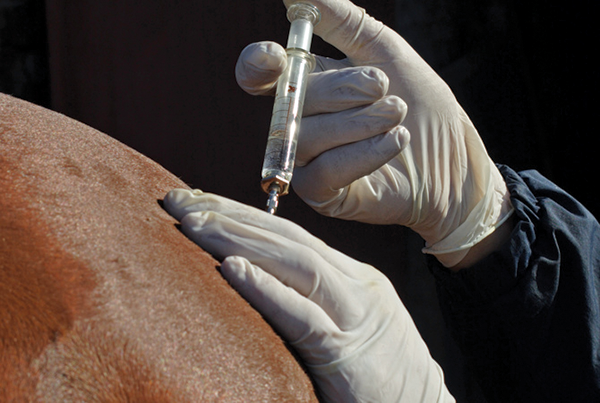By Daniel H. Grove, DVM

The vaccine debate is not limited to whether or not to vaccinate your children. The debate continues over into our pets also. With horses, some people have the unfortunate experience of vaccine reactions that give the pause for future vaccines. So, with such concern over the vaccination of animals, we will review what is considered the minimum vaccines for all horses and what the optional ones are. First, let’s answer the question, “Do I really need to vaccinate my horse?”
It is mid May when I am writing this article. Since the beginning of this month, there have been reported outbreaks of strangles, equine herpes virus, equine infectious anemia, equine influenza, and eastern equine encephalitis. All of these disease have vaccines, except equine infectious anemia. All of these disease can lead to the death of your horse, never mind the fact that if your horse has these diseases, they can be spread to other horses. So, do you need to vaccinate? YES!
A few years ago, the American Association of Equine Practioners (AAEP) established their recommendations for core vaccines. These vaccines are recommended for all horses in the U.S. The diseases are rabies, eastern equine encephalitis, western equine encephalitis, West Nile, and tetanus. The vaccines for these disease are very efficacious and severe reactions are rare. Mild reactions such as sore muscle can occur, but it is usually transient. There are vaccines for other diseases such as equine influenza, equine herpes virus (Rhino), and strangles. These vaccines are recommended based off of your risk as determined by your veterinarian.
So how do these vaccines work? Well, most of the vaccines we use in horses are killed vaccines. They contain two main parts, the antigen,and the adjuvant. The antigen is all or part of the organism that causes the disease. The adjuvant is the component of the vaccine that stimulates the body to react and develop immunity against the antigen(s). The companies that make these vaccines have to find the right combination of these two items to get an immune response. They are looking to get the most reaction with the least side effects. It is a difficult balancing act since we are dealing with animals that can react differently to the same thing.
How often should we vaccinate? This is also a big topic of debate. Some of the vaccines give a longer term of protection versus other vaccines. Blood testing is a common way we try to evaluate the level of immunity an animal may have against a specific disease. Most of the diseases do not have established cut-offs for what titer levels are considered protective. Another twist in the story is that some parts of the immune system are not able to be measured. All of these things play a role and make it very challenging to answer this question with certainty.
Disease prevention is the least expensive and most effective way to eliminate or minimize diseases. Vaccines play a crucial role in keeping not only your horse safe, but minimizing the risk of your animal getting another sick. Please, discuss with your veterinarian your options, and at least vaccinate your horses for the core diseases.
–Dan
Leave a Comment
All fields must be filled in to leave a message.